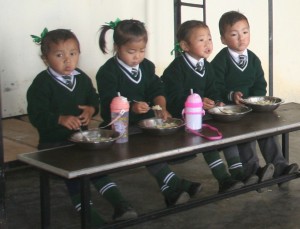Project #312 – 2013-2016
Update December 2015 : The latest news from Lama Paljor is that the children are much healthier now that they are enjoying a nutritious lunch. For many who come from extremely poor families, this lunch is the most substantial meal of the day. The children are not falling asleep during the afternoon classes, and are better able to concentrate. Almost all the mothers are now able to work in their fields, and work on the roads – but this work is intermittent; they may get work perhaps for a month, and then none for a couple of months. Lama Paljor feels, therefore, that he cannot ask the parents to pay for the lunch.

He had hoped to have the greenhouse up and running this past summer, but heavy rains and landslides (caused perhaps by the massive Himalayan earthquakes this year) have prevented the construction. The land has been levelled, and the supplies are purchased, so we hope he is soon able to build the greenhouse and start growing vegetables.
TRAS has agreed to fund the lunch program for a further three months.
Project Overview: Sikkim is in the remote northern reaches of India, against the border with Tibet. Lama Paljor has taken up the cause of educating the children of Tibetan refugees who live in tiny villages on the Indian side of the border. The men and many women work at road building for the Indian Army – backbreaking work, done by hand. Lama Paljor has built a hostel in the nearest little town (TRAS paid for half the third floor and the retaining wall) and now has opened a school to give a decent education to the village and local children. The children from the villages live in the hostel and are given a nourishing lunch, but the local children had to walk home for lunch. He asked if TRAS would provide a school lunch program.
Why, if they could get lunch at home, was this necessary?
Here’s the story behind the request: the lunch the mothers could provide was meagre in the extreme; the children were not getting enough nutrition to be able to concentrate; they were often late back to school because of the distances and missed part of the afternoon classes; their mothers could not work because they had to be at home to feed their children. TRAS agreed to a one-year pilot project, and with a mere $3,014 the children are better fed, the school results are better, the children are healthier and the mothers are able to do other work. Lama Paljor has asked TRAS to provide lunches for 90 children for one more year and will continue to work on plans for a long-term solution, possibly building a greenhouse so that fresh veggies will be available year round.
Funds needed by March 2016 – $5,950
